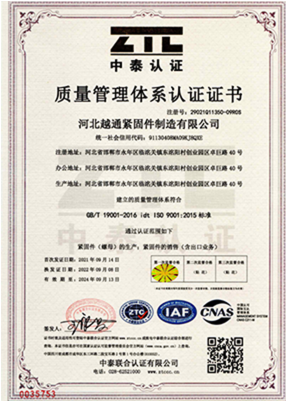dec . 06, 2024 00:59 Back to list
flat washer nut
Understanding Flat Washer Nuts A Comprehensive Guide
Flat washer nuts are essential components in various mechanical and structural applications, serving a crucial role in fastener assemblies. They are often overlooked yet play an integral part in ensuring the durability and reliability of connections in machinery, construction, and everyday items. In this article, we will explore the function, benefits, materials, and applications of flat washer nuts, along with tips for selecting and using them effectively.
What is a Flat Washer Nut?
A flat washer nut combines a flat washer with a nut, creating a single unit that enhances the performance of fasteners. The flat washer disperses the load from the nut over a broader area, preventing damage to the surface being fastened. This is paramount in applications where the surface material is softer or more prone to deformation. The nut, which is typically made of metal, engages with a bolt or threaded rod, providing secure attachment points for the assembly.
Functions of Flat Washer Nuts
1. Load Distribution One of the primary reasons for using flat washer nuts is their ability to distribute the load across a larger surface area. This minimizes the risk of surface damage and ensures that the connection remains secure even under stress.
2. Vibration Resistance In applications where equipment or machinery vibrates, flat washer nuts can help prevent loosening. By providing additional friction and a larger surface area, the likelihood of disconnection is significantly reduced.
3. Corrosion Prevention Many flat washer nuts are designed with materials or coatings that enhance their resistance to corrosion. This is particularly important in outdoor applications or environments where moisture and chemicals are present.
Benefits of Using Flat Washer Nuts
- Versatility Flat washer nuts can be found in a variety of sizes and materials, making them suitable for diverse applications from construction to automotive engineering.
- Ease of Use They can simplify assembly processes, especially in tight spaces, allowing for easier maneuverability and quicker installation.
- Cost-Effectiveness Flat washer nuts are relatively inexpensive, and their ability to prevent failures can save costs associated with repairs and maintenance in high-stake applications.
Materials Used in Flat Washer Nuts
Flat washer nuts are available in several materials, each offering unique properties suited for specific environments
flat washer nut

- Steel Commonly used for its strength and durability, steel flat washer nuts can be treated for corrosion resistance, such as with zinc plating.
- Stainless Steel Ideal for applications requiring higher corrosion resistance, stainless steel flat washer nuts are often used in marine environments or chemical processing plants.
- Plastic For applications where electrical insulation is necessary, or where weight reduction is crucial, plastic flat washer nuts serve as viable alternatives.
Applications of Flat Washer Nuts
Flat washer nuts are employed across various industries, including
- Construction Used in structural connections, ensuring beams and columns are securely held together while distributing loads.
- Automotive Found in numerous vehicle components, they help maintain the integrity of critical assemblies such as engines and chassis.
- Manufacturing Essential in machinery, they assist in securing parts that may be subject to movement and stress, ensuring overall functionality.
Tips for Selection and Use
When selecting flat washer nuts, consider the following
- Load Requirements Ensure the washer nut can handle the maximum load of your application.
- Material Compatibility Choose a material that will resist the environmental factors present in your application.
- Size and Thread Compatibility Verify that the size and thread of the nut fit the corresponding bolt or screw for optimal performance.
In conclusion, flat washer nuts are indispensable components that enhance the reliability and effectiveness of fastening systems. Understanding their function, benefits, and proper selection can lead to improved performance in various applications. Whether you’re working in construction, manufacturing, or automotive repair, paying attention to these small yet significant parts can contribute to the overall success and longevity of your projects.
-
The Ubiquitous Reach of DIN934 in Application Realms
NewsMay.16,2025
-
Exploring Different Bolt Types
NewsMay.16,2025
-
Cracking the Code of Sleeve Anchor Mastery
NewsMay.16,2025
-
Clamp Design Principles,Types and Innovations
NewsMay.16,2025
-
Artistry Inspired by the Humble Anchor Bolt
NewsMay.16,2025
-
A Deep Dive into Screw Types
NewsMay.16,2025


